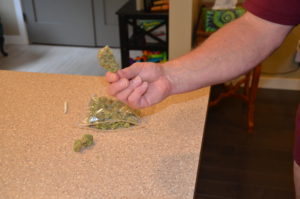 If you struggle with alcohol, you likely know the consequences of over indulging. If you use marijuana excessively, you probably think the benefits outweigh the negatives. That’s because most chronic pot smokers use marijuana to deal with anxiety, depression, anger, and a variety of other emotions.
If you struggle with alcohol, you likely know the consequences of over indulging. If you use marijuana excessively, you probably think the benefits outweigh the negatives. That’s because most chronic pot smokers use marijuana to deal with anxiety, depression, anger, and a variety of other emotions.
While friends and family members may view marijuana as a problem for the chronic user, the user sees marijuana as the solution to their problem.
So what problems exactly is Marijuana solving for chronic users? Almost every chronic user can tell you why they use marijuana and what it does for them.
For many users, marijuana gets rid of anxiety. For others, it alleviates ADHD symptoms such as restlessness and lack of concentration. For others it alleviates depression. Some use marijuana to control angry outbursts.
In other words, the person uses marijuana to regulate difficult and persistent emotions.
Isn’t this Medical Marijuana then?
 The problem with using weed as medicine to regulate emotions is that it is a circular problem; the more you use weed to regulate emotions, the more inept you become at regulating emotions on your own. This cycle makes Marijuana psychologically, as well as physically addicting.
The problem with using weed as medicine to regulate emotions is that it is a circular problem; the more you use weed to regulate emotions, the more inept you become at regulating emotions on your own. This cycle makes Marijuana psychologically, as well as physically addicting.
Adolescence is a time when many young people experience anxiety, low self esteem, depression, and frustration. Adolescents who don’t use alcohol or drugs usually find healthy ways to cope with these painful emotions.
The adolescent who uses pot to deal with difficulties often doesn’t learn healthy ways to regulate emotions.
The average age children begin smoking pot is sixteen. Many begin much younger. As their occasional pot use turns into chronic use, their social and emotional skills become stunted.
The more pot regulates a person’s emotions, the less likely they are to develop coping skills on their own. It isn’t uncommon to find a chronic pot smoker in his 50’s, who has smoked almost daily since high school.
The Downside to Chronic Pot Use
 Many pot smokers do see a downside to chronic, daily use. They know they are addicted and if they don’t have weed, their anxiety may increase to the point of paranoia. They will experience unpleasant emotions that they are trying so hard to avoid.
Many pot smokers do see a downside to chronic, daily use. They know they are addicted and if they don’t have weed, their anxiety may increase to the point of paranoia. They will experience unpleasant emotions that they are trying so hard to avoid.
Typical side effects of quitting pot are difficulty sleeping, irritability, depression, and restlessness.
Because the person has few skills to cope with unpleasant emotions, what others find uncomfortable, they experience as unbearable.
Chronic pot users may have difficulty in their relationships. Family members may object to the constant pot smoking and complain that they are disengaged and not fully present.
Pot smokers believe that they will be even more unpleasant to be around if they quit smoking. They are probably right, at least temporarily.
Despite the annoying downside to smoking pot, many users see these problems as minor compared to the benefits. Pot helps them regulate their emotions and they see this is critical to their well-being.
As with alcoholics, chronic users don’t get high as much as they maintain their version of normal. A chronic user may light up first thing in the morning and continue to smoke throughout the day.
Others don’t notice they’re high because years of practice means the person can function reasonably well while impaired. They have developed tolerance.
So why quit?
With the perceived emotional benefits, it’s easy to see why chronic pot smokers aren’t motivated to quit. Unfortunately, as long as they continue to use pot to regulate their emotions, they rob themselves of the opportunity to learn healthy ways to cope.
Most chronic pot smokers acknowledge privately, and sometimes to others, that they see themselves as defective. They know they are not great at coping and pot is a crutch.
By continuing to use pot to regulate emotions, chronic smokes rob themselves of healthy self-esteem and a feeling of competency.
Learning to regulate emotions after years of chronic pot use can be difficult. Just because it’s difficult, doesn’t mean it’s impossible.
There is Help
There is help for anxiety, depression, and other mood disorders. Quitting pot doesn’t have to mean white knuckling your way through life. With counselling and possibly medication, you can learn to regulate your emotions without pot. Living without pot gets easier with practice. Check out resources listed below for help with quitting.
DBT Skill: Pros and Cons
Evaluating pros and cons helps us think through the positive and negative consequences of our behaviour. Many people do a simple pros and cons list looking at only one angle, such as the pros and cons of quitting pot, breaking up with my girlfriend, quitting my job etc. However, it is more effective to do the pros and cons of doing something AND the pros and cons of not doing something. This four-part grid asks the following questions:
- What are the advantages of continuing as I am?
- What are the disadvantages of continuing as I am?
- What are the advantages of changing the situation?
- What are the disadvantages of changing the situation?
Although these questions look like they are similar, as you start to answer the questions, you realize that doing the four questions rather than the two, you get a bit more information and a greater perspective.
For more information check out the related posts and additional resources section below. For specific DBT skills go to DBT Skills in the menu bar.
If you have an experience you’d like to share, add a comment at the bottom of the page. I’d love to hear from you.
“The greatest ability as humans is not to change the world; but to change ourselves.”
Mahatma Gandhi
Related Posts
3 Easy Steps to Self Acceptance
Trust Yourself and Heal from Social Anxiety
How to Stop Faulty Thinking Habits
Pain is Inevitable but Suffering is Optional
Additional Resources
